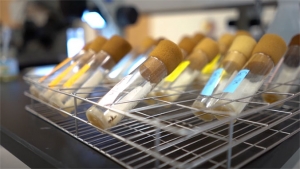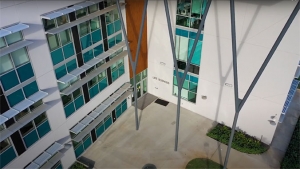The natural and human “landscape” of Hawaiʻi offers opportunities for the development of Earth’s microbiome research that exists nowhere else on the planet. As such, the University of Hawaiʻi is well positioned to make transformative contributions to this field of microbial research through a collaboration with the National Institutes of Health Center of Biomedical Research Excellence (COBRE) grants.
The COBRE technical are housed in UH Mānoa’s Life Sciences Building (LSB), with project leaders in LSB as well as spread across the campus. The aim is to develop the tools to understand the interface between human and environmental health, with a focus on the microbial forces shaping these dimensions of the biosphere.


A video highlighting UH Mānoa’s COBRE research projects is available online.
Each COBRE grant develops a series of cores that are expected to establish and become sustainable for the university where they are created. Within the last 10 years, UH has hired more than 20 academics into the junior tenure-track ranks whose research concentration is on environmental microbiomes, wherever they may occur (human body, plant roots, water, soil, insects, other animals, etc).
“We have three cores—a microscopy core, an insectary and a molecular biology/biochemistry core that function in parallel to provide the platform for the building of competitive research programs, not only for the above-mentioned junior faculty, but for all UH researchers who might want to become involved with this arena,” said Margaret McFall-Ngai, professor at UH Mānoa’s Pacific Biosciences Research Center (PRBC). She and Ned Ruby, also in PRBC, are the COBRE principal investigators.
“The center has every opportunity for being a mecca for researchers from across the nation and around the world.”
The approaches are highly diverse—from engineering and chemistry to the study of model systems. With the construction of LSB, these cores have found a new and permanent home. This has given the center the “wings” needed to perform at the highest possible levels of science.
“The COBRE is a gift to UH. It is the opportunity to create an active center for the study of the dynamic relationship between Earth’s microbiomes and human health,” said McFall-Ngai. “This gift will not only benefit researchers at UH, but the center has every opportunity for being a mecca for researchers from across the nation and around the world.”


